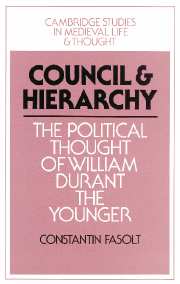Book contents
- Frontmatter
- Contents
- Acknowledgments
- List of abbreviations
- List of manuscript sigla
- INTRODUCTION
- PART I THE FORMATION OF INTEREST
- 1 THE BISHOPS OF MENDE
- 2 THE STATE OF THE CHURCH
- 3 THE TWILIGHT OF AUTONOMY
- RESULTS: LIBERTY AND COMPROMISE
- PART II THE ASSERTION OF JUSTICE
- PART III THE INCIDENCE OF POWER
- CONCLUSION
- Appendix: A note on texts and citations
- Bibliography
- Concordance
- Index
- Cambridge studies in medieval life and thought Fourth series
3 - THE TWILIGHT OF AUTONOMY
Published online by Cambridge University Press: 06 July 2010
- Frontmatter
- Contents
- Acknowledgments
- List of abbreviations
- List of manuscript sigla
- INTRODUCTION
- PART I THE FORMATION OF INTEREST
- 1 THE BISHOPS OF MENDE
- 2 THE STATE OF THE CHURCH
- 3 THE TWILIGHT OF AUTONOMY
- RESULTS: LIBERTY AND COMPROMISE
- PART II THE ASSERTION OF JUSTICE
- PART III THE INCIDENCE OF POWER
- CONCLUSION
- Appendix: A note on texts and citations
- Bibliography
- Concordance
- Index
- Cambridge studies in medieval life and thought Fourth series
Summary
Desiring to provide for the peace and quiet of the bishop and his church as well as for the utility and security of the subjects of the land, we have finally concluded a general transaction, a concord, a composition, and an association with our beloved and faithful William.
Philip the FairIf William Durant the Elder ever entertained any plans to play an active role in Gabalitan politics, in the event he never had a chance. After only four years his stay in Mende was cut short by an order from Boniface VIII to return to Italy and resume his previous duties in the papal states for which, it seems, his experience was invaluable. Shortly thereafter, on 1 November 1296, he died without having returned to Mende and was buried in Sta Maria sopra Minerva in Rome. A few weeks later, on 17 December 1296, Boniface VIII appointed his nephew, William Durant the Younger, to succeed him.
WILLIAM DURANT THE YOUNGER (1296–1330)
What we know about William Durant the Younger's early years is similar to what we know about his uncle, and just as scanty. He, too, was born in Puimisson, probably not long after 1266. He, too, must have studied law, but the circumstances of this are unclear. Probably he learned something from his uncle and perhaps he attended one of the centres of legal training in southern France. He may have gone on to a major university, but it is impossible to tell which one.
- Type
- Chapter
- Information
- Council and HierarchyThe Political Thought of William Durant the Younger, pp. 73 - 100Publisher: Cambridge University PressPrint publication year: 1991



